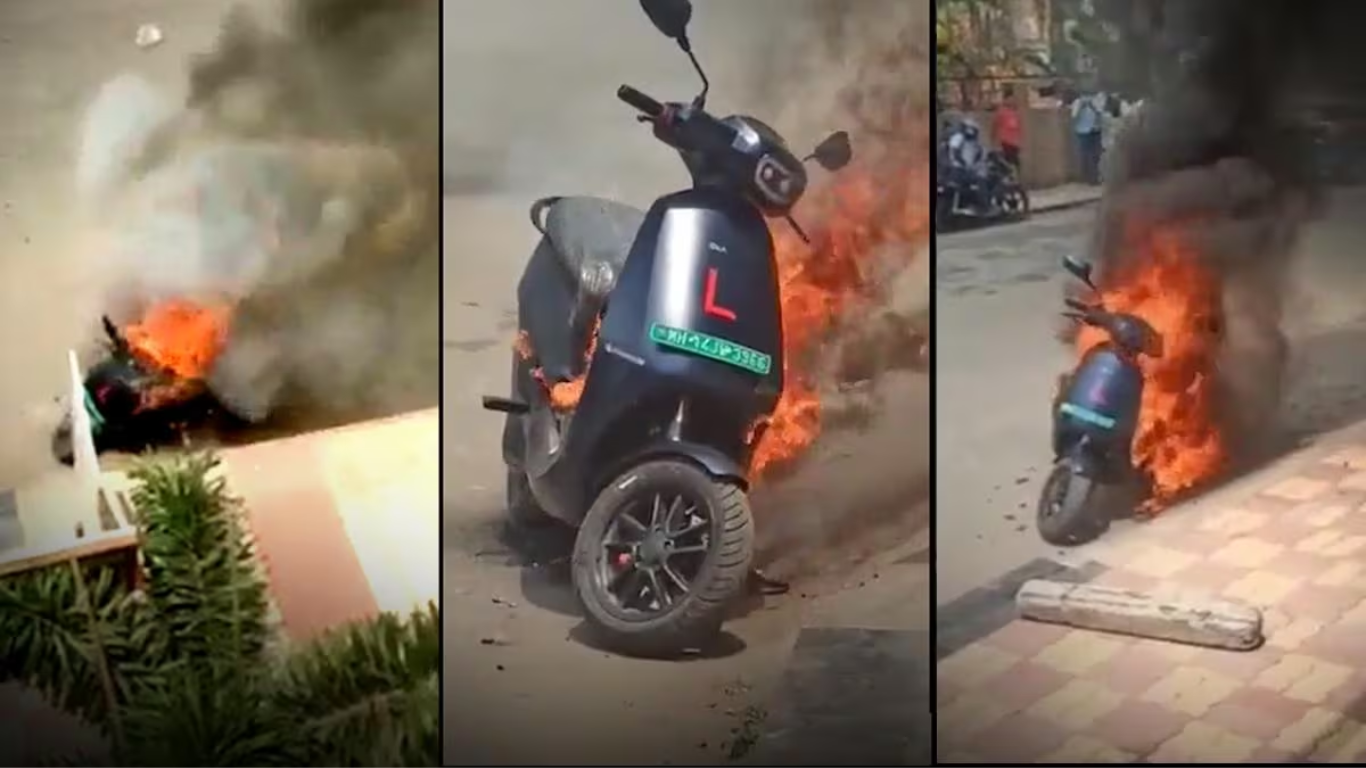Ad
Ad
Don’t Let Your Electric Two-Wheeler Burn You: Tips to Prevent Li-Ion Battery Fires
Electric two-wheeler fires are caused by battery issues. Prevent electric scooter fires by following these battery safety tips. Keep your electric two-wheeler cool and protected from flames.

Electric two-wheelers are not only the future of mobility in India but also are economical and easy to ride. The only draw back is that they also come with a risk of catching fire, as many unfortunate incidents have shown. How can you prevent your electric scooter from turning into a fireball? Read on to find out.
What makes electric two-wheelers go up in flames?
Ad
Ad

The answer lies in the heart of your electric vehicle: the battery. Most electric two-wheelers use lithium-ion batteries, which are also found in your phone, laptop and other gadgets. These batteries are great because they can store a lot of energy, weigh less, last longer and charge faster than other types of batteries. But they also have a dark side: they can overheat, short circuit and explode. This is called thermal runaway, and it can happen when the battery gets too hot, too damaged or too stressed.
There are many things that can cause thermal runaway in your electric two-wheeler's battery, such as:
Cutting corners on quality: Some electric two-wheeler makers may have skipped some steps in the research and development (R&D) and testing of their products, in order to launch them quickly and cheaply. This may have led to poor or faulty batteries or battery management systems (BMS), which are supposed to monitor and control the battery's voltage, current and temperature.
Ignoring the Indian climate: Some electric two-wheeler makers may have imported batteries or BMS from other countries, without customizing them for the Indian conditions. India has a diverse and harsh climate, with high temperatures, humidity and dust levels. These factors can affect the performance and safety of the batteries, especially if they are not designed or tested for them.
Misusing or abusing the battery: Some customers may not know how to properly maintain and use their electric two-wheelers, especially the batteries. For example, they may overcharge or undercharge the battery, expose it to direct sunlight or water, or use wrong or fake chargers or accessories. These practices can harm the battery or make it act up.
How to keep your electric two-wheeler from catching fire?

Protect your battery from damage: This means you should avoid crushing, puncturing or soaking your battery. These actions can break the internal structure of the battery and cause a short circuit or a chemical reaction that can lead to fire or explosion.
Charge your battery correctly: This means you should use the original or a reliable charger that matches your battery's voltage and current. Using a wrong or faulty charger can overcharge or undercharge your battery, which can lower its performance or make it overheat.
Keep your battery cool: This means you should not store, use, or charge your battery in very hot or very cold places. High temperatures can increase the chemical activity inside the battery and make it more likely to catch fire. Low temperatures can decrease the chemical activity and make it harder for the battery to deliver power.
Unplug when fully charged: This means you should not leave your battery plugged in after it reaches 100% charge level. Keeping the battery at full charge for a long time can stress it and reduce its lifespan.
Charge from 20% to 80% and back: This means you should try to keep your battery level between 20% and 80% most of the time. This is called the optimal charging range, and it can help extend the battery life and prevent degradation. Charging from very low to very high levels can wear out the battery faster and make it lose capacity.

Have a clear exit when charging: This means you should make sure you can easily get out of the room or property where you charge your device in case of fire. You don't want to be trapped by flames or smoke if something goes wrong with your battery or charger.
Keep good air circulation and hard surface: This means you should charge your device on a flat, solid surface that allows air to circulate around it. This can help keep your device cool and prevent overheating. You should avoid charging on soft, flammable surfaces like carpets, beds, or sofas.
Don't keep all battery items together when traveling: This means you should spread out your devices and spare batteries when you pack them in your luggage or carry-on bag. This can reduce the chance of them bumping into each other or getting damaged by other items. It can also prevent a chain reaction if one of them catches fire or explodes.
If battery or charger overheats, stop using and move away: This means you should pay attention to the temperature of your battery and charger when you use or charge them. If they feel too hot to touch, you should unplug them and take them away from anything that can burn. You should also stop using your device if it shows signs of swelling, leaking, smoking, or making noises.
Put on non-flammable surface and outside if possible: This means you should place your overheated battery or charger on a surface that won't catch fire, like metal, ceramic, or stone. You should also try to take it outside if you can, where there is more ventilation and less risk of spreading fire to other things.
Use special products to stop and contain fire: This means you should use products that are designed to deal with lithium-ion battery fires, like fire extinguishers, fire blankets, or fire bags. These products can help smother the flames, cool down the battery, and isolate it from oxygen. You should not use water or other liquids to put out a lithium-ion battery fire, as they can make it worse by reacting with the chemicals inside the battery.
More Articles
Don’t Let the Wrong Oil Drain Your Engine’s Power – How to Choose the Best Engine Oil?
Choosing the right engine oil is essential for your vehicle's engine health and performance. Learn about viscosity, oil types (mineral, semi-synthetic, synthetic), and key factors to consider when selecting the best oil for your vehicle.
07-Jan-2025 09:16 AM
Read Full ArticleDon’t Let the Wrong Oil Drain Your Engine’s Power – How to Choose the Best Engine Oil?
Choosing the right engine oil is essential for your vehicle's engine health and performance. Learn about viscosity, oil types (mineral, semi-synthetic, synthetic), and key factors to consider when selecting the best oil for your vehicle.
07-Jan-2025 09:16 AM
Read Full ArticleMost Selling Car Models in 2024 in India: Sales Analysis Based on Brand and Body Type
Gain a data-driven analysis of the 2024 automotive market, highlighting sales peaks, underperforming models, and the dominance of SUVs in India.
06-Jan-2025 08:34 AM
Read Full ArticleMost Selling Car Models in 2024 in India: Sales Analysis Based on Brand and Body Type
Gain a data-driven analysis of the 2024 automotive market, highlighting sales peaks, underperforming models, and the dominance of SUVs in India.
06-Jan-2025 08:34 AM
Read Full ArticleSafest Car in India: Five Star Global NCAP Rated Cars
Safety is growing all the more indispensable for Indian car buyers. The benchmarking of safety standards of vehicles has come in the form of the Global New Car Assessment Program (GNCAP).
02-Jan-2025 09:58 AM
Read Full ArticleSafest Car in India: Five Star Global NCAP Rated Cars
Safety is growing all the more indispensable for Indian car buyers. The benchmarking of safety standards of vehicles has come in the form of the Global New Car Assessment Program (GNCAP).
02-Jan-2025 09:58 AM
Read Full Article10 Tips to Improve Your Bike’s Mileage
Improving your bike's fuel efficiency isn't rocket science. You can get the most out of every drop of fuel by following smart riding habits, routine maintenance, and a little mindfulness.
30-Dec-2024 01:09 PM
Read Full Article10 Tips to Improve Your Bike’s Mileage
Improving your bike's fuel efficiency isn't rocket science. You can get the most out of every drop of fuel by following smart riding habits, routine maintenance, and a little mindfulness.
30-Dec-2024 01:09 PM
Read Full ArticleHow Engine Technology Impacts Mileage: Carburetor vs. Fuel Injection
The performance and fuel efficiency of vehicles are greatly impacted by the substantial advancements in engine technology. The way fuel is supplied to the engine is one of the most important distinctions.
30-Dec-2024 06:48 AM
Read Full ArticleHow Engine Technology Impacts Mileage: Carburetor vs. Fuel Injection
The performance and fuel efficiency of vehicles are greatly impacted by the substantial advancements in engine technology. The way fuel is supplied to the engine is one of the most important distinctions.
30-Dec-2024 06:48 AM
Read Full ArticleThe Effect of Weather Conditions on Motorcycle Mileage
Weather plays a huge role in determining how far you can go on a liter of fuel. Whether it is a sunny day, a cold winter morning, a rainy afternoon, or a windy evening, each condition affects your bike's mileage differently.
27-Dec-2024 12:27 PM
Read Full ArticleThe Effect of Weather Conditions on Motorcycle Mileage
Weather plays a huge role in determining how far you can go on a liter of fuel. Whether it is a sunny day, a cold winter morning, a rainy afternoon, or a windy evening, each condition affects your bike's mileage differently.
27-Dec-2024 12:27 PM
Read Full ArticleAd
Ad
Cars In India
Mercedes-Benz G-Class with EQ Power
₹ 3.00 Cr
Toyota Camry
₹ 48.00 Lakh
Honda Amaze
₹ 8.00 - 10.90 Lakh
Audi Q7
₹ 88.66 - 97.81 Lakh
Mahindra XEV 9e
₹ 21.90 - 30.50 Lakh
Tata Harrier EV
₹ 24.00 - 28.00 Lakh
MG M9 EV
₹ 1.00 - 1.10 Cr
Maruti e Vitara
₹ 20.00 - 25.00 Lakh
Hyundai Creta EV
₹ 22.00 - 26.00 Lakh
MG Cyberster
₹ 60.00 - 65.00 Lakh
Ad
Ad
Ad